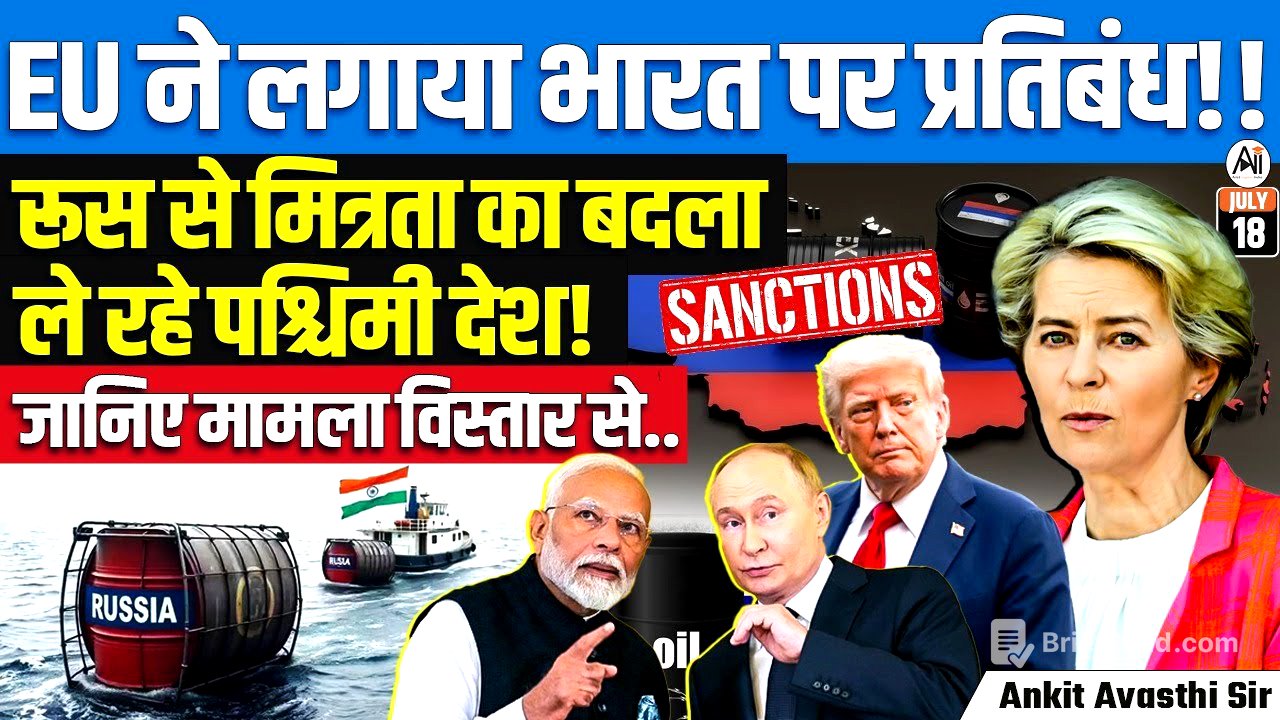TLDR;
This video discusses the European Union's (EU) sanctions on India due to its oil trade with Russia, exploring the reasons behind these sanctions and their potential impact. It examines India's role in refining and exporting Russian oil to Europe, Trump's threats to countries buying oil from Russia, and the EU's efforts to pressure Russia through sanctions. The video also explains the involvement of companies like Rosneft and the implications for India's energy security and trade relations.
- EU imposed sanctions on India for refining and exporting Russian oil.
- Trump threatened countries buying oil from Russia to pressure Russia over the Ukraine war.
- India, Russia, and Europe were involved in a complex oil trade, with India benefiting from discounted Russian oil.
Intro [0:00]
The host introduces the topic of discussion: Trump's attempts to stop the Russia-Ukraine war by threatening countries that buy oil from Russia, including India, China, and Brazil. Trump's strategy involved using an MP and the NATO chief to warn India of potential sanctions, such as a 500% tariff, if it continued to purchase oil from Russia. The core issue was that India was importing oil from Russia, refining it, and then exporting it to the European Union, which the EU realized was indirectly supporting Russia.
India’s Fuel Exports to Europe via Third Countries [4:51]
India had become a fuel exporter to Europe, utilizing routes through the Red Sea, Suez Canal, and the Cape of Good Hope. Data from August 17, 2024, shows significant monthly oil sales to Europe. India had doubled its petroleum exports to Europe in the last three years, largely due to oil imports from Russia.
Trump’s Role Behind the Russia-Ukraine War [8:22]
Trump's threats were directed at Europe because they needed oil, which they previously obtained from Russia but were now indirectly sourcing from India. Trump believed that by buying oil, India was helping to meet the needs of European countries, which in turn allowed Russia to continue its actions in Ukraine. Trump highlighted that Europe had spent more money on Russian oil and gas ($23.6 billion) than on defending Ukraine ($20 billion). To avoid potential sanctions and scrutiny, the EU distanced itself from India, using India's friendly relationship with Putin as a pretext.
EU’s 18th Round of Sanctions on Russia [11:45]
The EU announced its 18th round of sanctions on Russia, which included several key measures. They stopped funding 105 "shadow fleet" ships that were enabling Russian banks and banned the North Stream gas pipeline. The EU also imposed a lower oil price cap, reducing it to $47 per barrel to make it less profitable for Russia to extract oil. Additionally, sanctions were placed on Chinese banks supporting Russia and, for the first time, designated a flag registry and the largest Rosneft refinery in India.
What’s Inside EU’s 18th Sanctions Package? [15:33]
The EU sanctions targeted ships evading restrictions by using flags of convenience and shell companies to transport oil. Russia had deployed around 450 ships with altered identities to continue delivering goods. These ships would transport oil to India, where it was refined and then sent to Europe. To circumvent sanctions, some ships engaged in mid-sea transfers to smaller vessels for delivery to Europe. The EU's stricter measures aim to ban this practice, similar to a strict prohibition.
What’s the Full Story Behind Rosneft? [19:24]
Rosneft, a Russian government-owned company and Russia's largest oil refining company, strategically planned for future conflicts by investing in India. In 2016, Rosneft purchased a 49.6% stake in Essar (SR) Oil for $12.9 billion, marking a significant foreign direct investment in India's energy sector. Essar Oil was later renamed Nayara Energy. Nayara Energy operates an oil refinery in Vadinar, Gujarat, where Russian oil is refined and sold in India and exported to Europe.
Mukesh Ambani’s Deal with Rosneft Explained [22:38]
Mukesh Ambani, recognizing the opportunity, entered into a deal with Rosneft to purchase $12-13 billion worth of oil annually for 10 years. This oil would be refined at Reliance's Jamnagar Refinery, the world's largest private refinery, and then sold globally. This arrangement allowed India to benefit from discounted Russian oil, with traders making profits and the Indian government collecting taxes. However, the benefits of cheaper oil have not been passed on to Indian consumers. The European Union's sanctions, influenced by Trump's statements, aim to stop the flow of oil from Rosneft, impacting entities like Nayara Energy.








